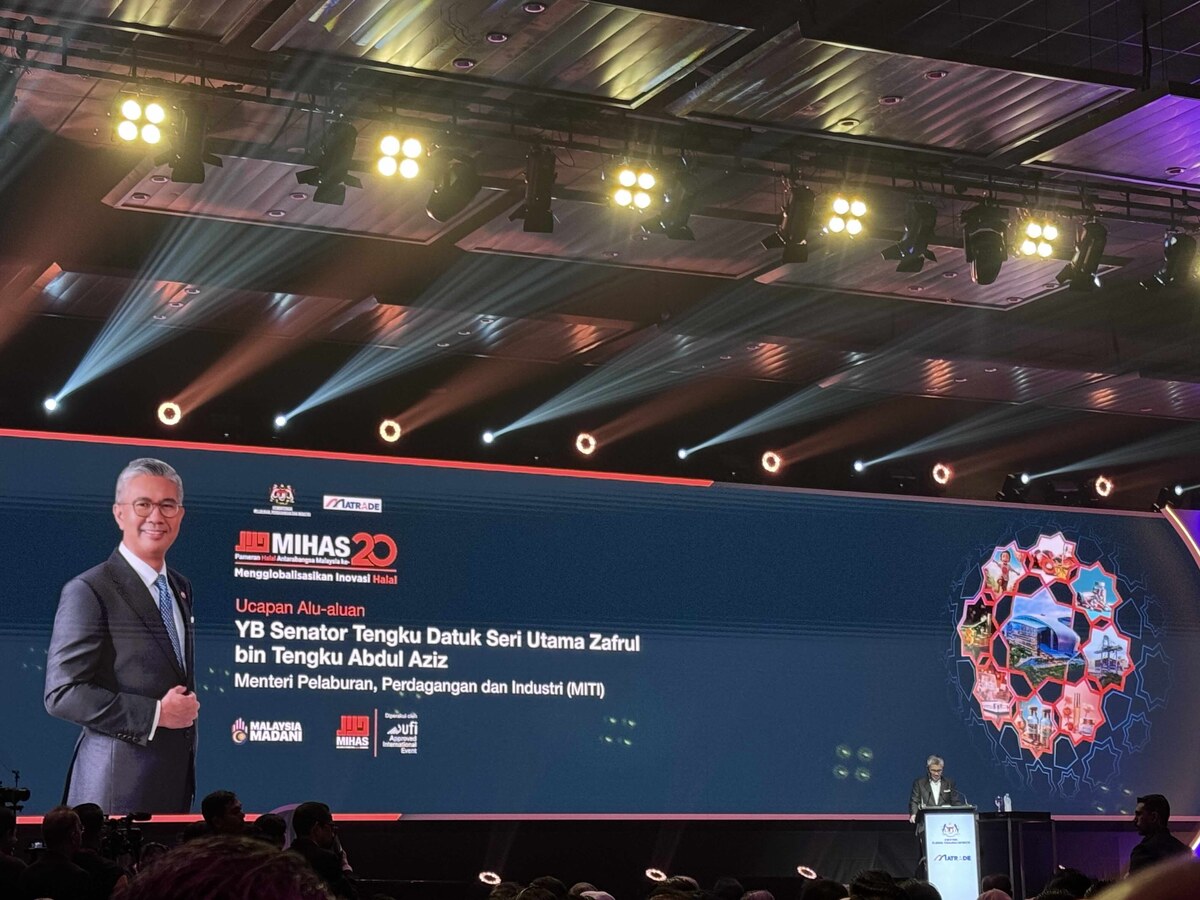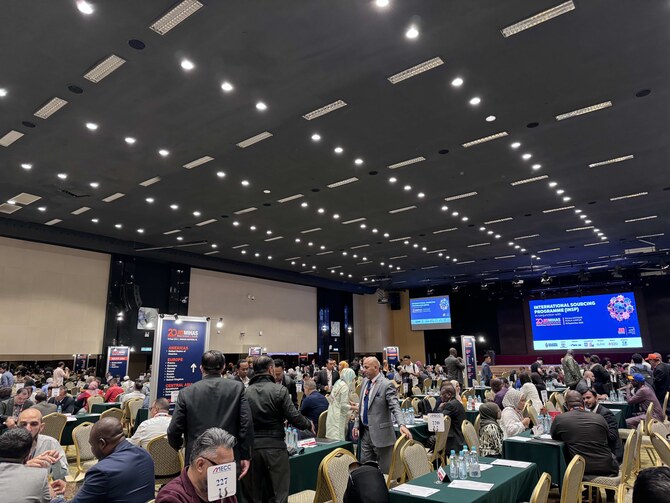RIYADH:Saudi Arabia has claimed third place among the top five participating countries at MIHAS 2024, the world’s largest halal trade fair, underscoring its significant role in the global halal market.
The Kingdom showcased its commitment to expanding the halal industry with 38 booths at the Malaysia International Halal Showcase, which attracted participants from 66 countries.
Held in Kuala Lumpur from Sept. 17 to 20, MIHAS 2024 was hosted by Malaysia’s Ministry of Investment, Trade, and Industry and organized by the Malaysia External Trade Development Corp. The leading countries included China, Indonesia, Saudi Arabia, South Korea, and Thailand, highlighting the event’s international appeal.
“MIHAS 2024 saw the participation of 38 booths and two buyers from Saudi Arabia,” said Reezal Merican Naina Merican, chairman of MATRADE.
He added: “We are optimistic that trade relations between Malaysia and Saudi Arabia will continue to strengthen, driven by the shared commitment of both nations to expand the halal sector, which remains the primary focus of MIHAS.”
The term “halal” translates to “permissible” or “lawful” in Arabic.
Malaysia’s halal exports
During the opening ceremony, Malaysia’s Minister of Investment, Trade, and Industry Utama Zafrul Abdul Aziz announced that the country’s halal export value reached nearly 55 billion Malaysian ringgits ($13 billion) in 2023, marking the second consecutive year it surpassed the 50-billion-ringgits threshold. The food and beverage sector accounted for the largest share, valued at 29.37 billion ringgits, reflecting a 5 percent increase from 2022. Other significant contributors included halal ingredients, cosmetics, palm oil derivatives, and pharmaceuticals.
“It has generated almost 25 billion ringgits in total sales, attracted 500,000 trade visitors, and significantly elevated Malaysia’s profile on the global stage,” Abdul Aziz added. MIHAS 2024 aims for 3.5 billion in sales. He also highlighted that the Malaysian government actively supports the halal industry, as global demand for halal products and services is projected to reach $5 trillion by 2030.
MIHAS expands to Dubai
Following 20 successful editions of MIHAS in Malaysia, the trade minister expressed excitement about the event’s international debut, dubbed MIHAS@Dubai.
Abdul Aziz said the goal is to leverage Dubai’s position as a key port city and the main hub for the Middle East and North Africa market, facilitating the import and distribution of Malaysian goods in the region. He set an export sales target of 1 billion ringgit for MIHAS Dubai and expressed confidence that participating Malaysian companies would achieve this goal.

Malaysia’s Minister of Investment, Trade, and Industry Utama Zafrul Abdul Aziz announced that the country’s halal export value reached nearly 55 billion Malaysian ringgit ($13 billion) in 2023. Supplied
“I meet new participation, and my encounters with our colleagues from Kyrgyzstan, Uzbekistan, Kazakhstan, recently have shown that the interest and commitment to collaborate with us is further enhanced,” said Malaysia’s Prime Minister Anwar Ibrahim during the opening ceremony.
He added: “I must, of course, take the opportunity to thank all my colleagues, leaders of these countries to UAE, to Saudi Arabia, Qatar, and of course, I will be leaving for Egypt soon in all these encounters without exception may I reiterate that the halal industry remains as a core of our campaign and program.”
A significant milestone this year is MIHAS receiving the Guinness World Record title for the Largest Attendance at a Halal Trade Show, with 38,566 visitors attending MIHAS 2023.
“MIHAS 2024 aims even higher as this exciting growth further cements MIHAS as the premier global halal showcase, making it a not-to-be-missed event for industry professionals worldwide,” Merican remarked.
International sourcing program
On the second day of the event, MATRADE hosted the largest International Sourcing Programme, featuring a lineup of at least 250 international buyers. One of the Saudi-based buyers, Ghaydaa Medical, specializes in healthcare supplies for the elderly and individuals with special needs, as well as health nutritional supplements.
Sameh Abdelhamed, general manager and pharmacist at Ghaydaa Medical, explained the importance of acquiring halal certification to ensure quality. “Let’s say I’m a producer, and I have a factory that produces halal products. This is when I have to look at the process of making it. This includes looking at the components, the procedure of using it. This process is under the justification of a halal product,” Abdelhamed told Arab News.
He emphasized the company's goal to expand its product offerings in the Gulf region, particularly in Saudi Arabia, which has abundant resources and benefits for customers and businesses.
Saudi investments in Malaysia
According to MATRADE, as of June, 19 projects involving investments from Saudi Arabia were approved, totaling $1.65 billion and expected to generate 2,570 jobs in Malaysia. These projects mainly focus on the pharmaceutical, electronics, and food processing sectors. Four manufacturing projects backed by Saudi investments, amounting to $53 million, have already been established in Malaysia, creating 717 jobs. Notable Saudi companies operating in Malaysia include Saudi Aramco, Al Rajhi Group, and AJ Biologics.
Trade dynamics between Malaysia and Saudi Arabia
In 2023, trade between Malaysia and Saudi Arabia reached $11.06 billion, with Malaysia exporting $1.49 billion worth of goods to the Kingdom, while Saudi exports to Malaysia totaled $9.56 billion. This strong trade partnership has positioned Saudi Arabia as Malaysia’s leading trading partner and top source of imports in the West Asian region.
In 2023, Malaysia’s total imports from Saudi Arabia rose by 11.6 percent, reaching $9.57 billion. From January to July 2024, imports amounted to $4.5 billion, reflecting a 22.4% decline compared to the same period in 2023, indicating shifts in trade dynamics between the two countries.
In June, MATRADE Jeddah, the commercial section of the Malaysian Consulate General in Jeddah, facilitated the participation of 33 Malaysian exhibitors in the Saudi Food Show 2024, an international exhibition focused on the food and beverage industry held in Riyadh. According to MATRADE Jeddah, the Kingdom is viewed as a key market for diversification and growth in the food industry, offering Malaysian exporters new opportunities in a market valued at $45 billion, the largest in the Middle East.
The global halal market is projected to grow to $5 trillion by 2030, while domestic growth in Malaysia is estimated to reach $113.3 billion.



























